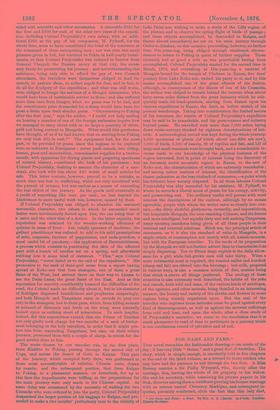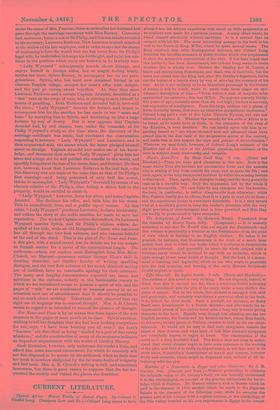FOR NAME AND FAME.* Tins novel resembles the fashionable drawing-room
music of the day ; it has very little "theme," and a great deal of variation. The story, which is simple enough, is succinctly told in five chapters at the end of the third volume, as a reward to those readers who may have had the patience to toil through the two first. A Miss Burney marries a Sir Philip Wynyard, who, shortly after the marriage, dies, leaving the whole of his property to his widow. She and his secretary, while examining the private papers in his desk, discover among them a certificate proving his former marriage with an actress named Clemency Marklyne, and subsequent in- quiries, privately conducted, elicit the fact that this lady died, • For Name and Fame : a Nord. By Kn. A. B. Chan*. In a yols. London: Tinsley Brothers.
under the name of Mrs. Penrose, three months after her husband had gone through the marriage ceremony with Miss Burney. Clemency had, moreover, borne a son to Sir Philip, and this son stands revealed in his secretary, Laurence Ruthven. Now Laurence is much attached to the widow of his late employer, and in order to save her the shame of confessing before the world that she has never been Sir Philip's legal wife, he undertakes to forego his birthright, and to let her con- tinue in the position which every one believes to be lawfully hers.
"Lady Wynyard" subsequently travels about Europe, and enjoys herself in foreign cities, but at length feeling lonely, invites her niece, Sylvia Burney, to accompany her on her pere- grinations. Sylvia, who has until now remained buried in an obscure English village, accepts her aunt's offer with delight, and the pair go roving about together. At Nice they meet Laurence Ruthven and a certain Captain Arundel, described as a " fast " man on the verge of ruin, who is striving to save himself by means of gambling. Both Ruthven and Arundel fall in love with the niece ; "Lady Wynyard" favours the former, and hopes to recompense him for the sacrifice he has made to her "name and fame" by marrying him to Sylvia, and bestowing on him a large fortune by way of dowry. But it now appears that Captain Arundel had, by evil chance, been under the verandah of Sir Philip Wynyard's study at the time when the discovery of the marriage certificate was made, had overheard the conversation respecting it between "Lady Wynyard" and Laurence, and is thus acquainted with the secret which the latter pledged himself never to divulge. Captain Arundel now makes use of his know- ledge, and threatens that unless "Lady Wynyard" gives him her niece and a large dot, he -will-publish the scandal to the world, and speedily bringabout the loss of her name, fame, and fortune. He does not, however, know that Laurence Ruthven is the real heir,—for this discovery was not made at the same time as that of Sir Philip's first marriage—and being possessed of only half the secret, thinks to accomplish "Lady Wynyard's "downfall by means of an obscure relative of Sir Philip's, who, failing a direct heir to the property, would be entitled to claim it.
"Lady Wynyard," however, loves her niece, and hates Captain Arundel. She declines his offer, and bids him do his worst. This he immediately does, and a public expose ensues. At this crisis, "Lady Wynyard" produces Laurence, declares his identity, and relates the story of the noble sacrifice he made to save her reputation. The wicked Captain retires discomfited, Sir Laurence Wynyard marries Sylvia, and Sir Philip's whilom widow, de- spoiled of her title, weds an old Hungarian Count, who has loved her all through the two first volumes, and who remains faithful at the end of the third. This is the plot of For Name and Fame, a fair plot, with a sound moral, but its details are far too meagre to furnish matter for a novel of the conventional length. The authoress—whom our readers must distinguish from Mrs. Ross- Church, née M.anyat—possesses neither George Eliot's skill in drawing character, nor Ouida's faculty of writing sparkling dialogue, and the two first volumes of her novel, destitute as they are of incident, have no reasonable apology for their existence. The many and lengthy conversations reported are inane and spiritless in the extreme, nobody in the fashionable resorts to which we are introduced seems to possess a spark of wit, and the pages of " talk " we are condemned to traverse convey to us no sensation save one of astonishment that it should be possible to say so much about nothing. Talleyrand once observed that the right use of language was to conceal thought. Mrs. A. B. Church seems to regard it as intended to conceal the absence of thought.
For Name and Fame is by no means free from lapses of the sort common in the pages of most novels of its class. Sylvia's mother, wishing to tell her daughter that she had been looking everywhere for her, says, "I have been hunting you all over !" the hero's "features "are described as being "shaded by a pair of fine tawny whiskers ;" and the construction of many of the sentences indicates an imperfect acquaintance with the works of Lindley Murray.
Such blemishes, however, only embarrass the reader a little, and afford him some innocent amusement, for which he certainly will not feel disposed to be severe on the authoress, when he finds that her book is nowhere disfigured by the far worse faults of vulgarity and bad taste. Mrs. A. B. Church's writing is dull, and sometimes inaccurate, but there is good reason to suppose that she has fre- quented the society and visited the places she describes.



































 Previous page
Previous page